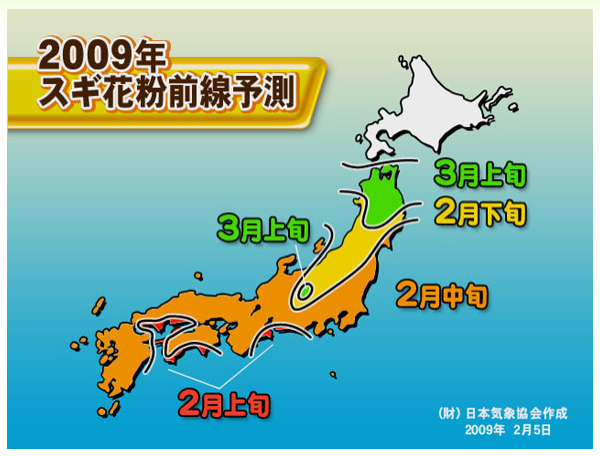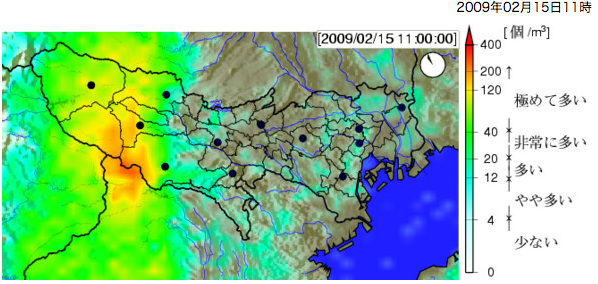
The cedar and cypress trees which cover about 15% of Japan have started pollinating and 20 million people - 1/5 of the population - are sneezing, sniffling, and scratching their eyes. Me included. Pollen allergies run you down and we’ll be feeling rotten until April. That is a long time to suffer, so most everyone makes an attempt to reduce their symptoms. There are a bevy of pills to pop but if you aren’t so keen on medication, choices involve a little more common sense but less convenience.
Allergy load
My allergist explained to me that everyone has an allergy load that their body can handle. If you go over the threshold, you start to have symptoms. So if you have sensitivities or allergies to things you can control, try to reduce your exposure during hayfever season. For example, I am allergic to oranges. Normally, I can have a small glass of orange juice in the morning and not feel any effect. But during spring when my system is already over its allergy threshold from pollen, orange juice gives me a nasty headache.
Filter the air
In Japan kafunsho season is also mask season. Wearing a surgical style mask has several benefits: it filters the air, hides your runny nose, and prevents the spread of other germs (who wants a cold on top of hayfever?). Masks look dorky and can be uncomfortable to wear, but they do work.
“I don’t care how stupid it looks, wear a mask,” MJ Daniels-Sueyasu recommends. ” The tricky thing is finding one to fit. I saw this guy on the train once and he had the most awesome mask ever; it was camo material and was flush against his face.” The variety of masks sold is amazing. This page lists 198 kinds that are specifically for pollen. And those are just the drug store selection. There are fashionable ones, too.
Glasses can help deflect the pollen, so trade your contacts for frames in the spring. If you don’t need vision correction, try sunglasses outdoors.
In your house, a HEPA air filter is said to be beneficial, especially in the bedroom where you spend so many hours resting your battle weary body.
Stay clean
The air isn’t the only thing you should try to clean. Spring cleaning is takes on a new meaning when you are trying to get rid of pollen in the house. Dust and vacuum daily if you can. Wash your curtains. Change your linens frequently and dry them indoors, rather than outdoors where they will collect pollen. I love sun-dried sheets and towels, so this recommendation upsets my housekeeping. If you sleep on futons, slip them into tightly woven bags before airing them.
Pollen settles in your hair so daily shampooing will help. YS Park makes a shampoo called Pollin that is supposed to help reduce pollen. Don’t know if it works, but it does smell nice. If you follow the Japanese custom of bathing at night, you’ll reduce the pollen you carry to bed. This could help you have a less sniffly morning.
Tod swears by jala neti, the Indian practice of rinsing the sinuses with warm saline solution, to help clean out the nose and “reset” it for a new day of pollen battle. He does it every day and rarely ever suffers from colds or hayfever. I am not so diligent, but it is refreshing to be able to breathe freely after a neti session.
Alternative treatments
If you plan ahead, you can try a regimen of local honey or bee pollen to strengthen your system against hayfever. Nettle, a mild anti-histamine, is said to be very effective in relieving symptoms. Sales of Chinese blackberry tea rise during kafuhsho season.
The Times Online suggests coating the inside of your nose with Vaseline to prevent the pollen from sticking to your nose.
If you wander though any Japanese housecleaning section at this time of year, you’ll see all sorts of pollen cut sprays - you apply them before going outside to help keep pollen from sticking to your clothes. Or you can shell out a lot of cash and wear specially woven fabrics that repel pollen. I don’t know if either of these work, but the manufacturers want you to think so.
Acupuncture and shiatsu can help you feel better, though they don’t treat the problem directly.

What are your favorite hayfever remedies?
Hi- i just started reading your blog on recommendation from a friend. do you know how to clean out the a/c and heater units? i know that’ll probably help with the hay fever, but the owner’s manual is all in japanese! does any one have any ideas?
Posted by: miki on February 17, 2009 08:11 PM